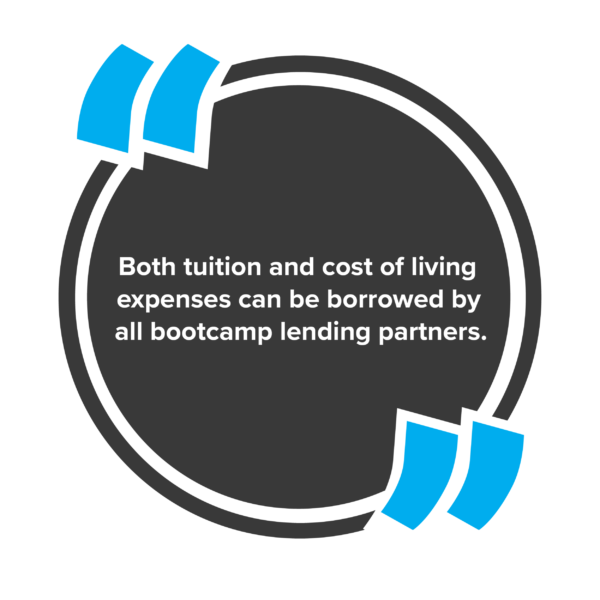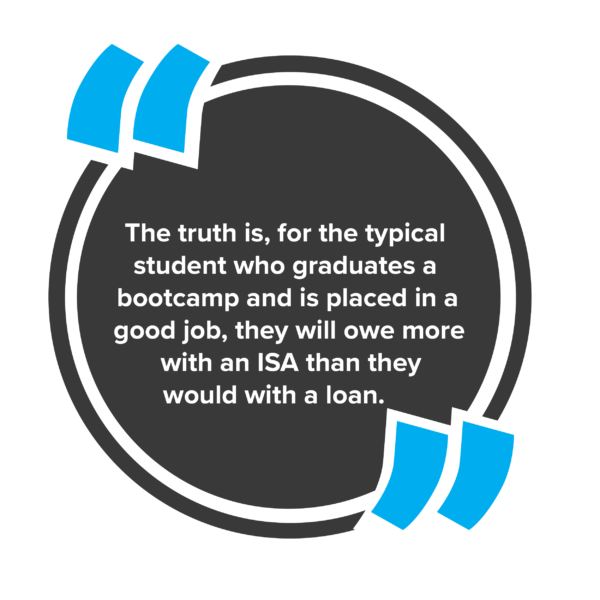How to Pay for a Coding Bootcamp
Attending a coding bootcamp can alter your career trajectory and put you on the path to secure a fulfilling job as a software developer. Achieving this goal requires a significant investment of time and money. There are many factors to consider when choosing the right bootcamp, but financing your education is one in particular that can be intimidating for many students.

Before we discuss the different ways to fund your bootcamp tuition, it’s important to consider what you are really looking for in a bootcamp. A quality bootcamp isn’t cheap, but that doesn’t mean that a bootcamp’s tuition price is a direct reflection of quality. The best way to understand cost is to understand value – what kind of resources can you expect as a student in the program, do they include equipment (a good laptop should cost over $1,000), and most importantly what’s the outcome? Real value comes from return on investment and that comes back to transparent placement outcomes. To see bootcamps that are committed to transparency in their outcomes, visit the Council on Integrity in Results Reporting (CIRR). If you are looking at a bootcamp that doesn’t publish their audited outcomes to CIRR, keep in mind that those outcomes are likely not verified by a third party and may not be entirely accurate.
Once you’ve found a bootcamp with transparent outcomes and are ready to begin your career transformation, you can start looking at payment options. Bootcamps may offer installment payments if you prefer to pay in cash or with a credit card, but credit cards can carry fees and cash is not an option for many students. Alternatively, there are many lending partners and products on the market that can help you get where you’re going. Before you look at different loan providers, make sure you are familiar with basic loan terms like APR and that you understand the factors that affect your credit score and where to find it. And don’t forget to look for a bootcamp that is helpful but fact-based when discussing your lending options.
As you compare lenders, it’s important to keep in mind that they will base their approval decisions and potentially even your interest rate on your credit history. For students with little or poor credit history, applying with a cosigner can increase your chance of being approved. Below are some of the most popular financing options available to bootcamp students.

WHICH LENDERS WORK WITH BOOTCAMPS?
Sallie Mae
Sallie Mae is the largest lender of private student loans in the country. It was originally created by the federal government in 1973 but was eventually privatized. There are only a handful of bootcamps in the country that Sallie Mae has agreed to work with to offer their Career Training Smart Option Student Loan. Being approved by Sallie Mae is itself a mark of quality for a bootcamp, as Sallie Mae bases their partnership decisions in part on reliable and transparent outcomes.
You won’t find a loan provider that is more flexible than Sallie Mae. They offer both variable and fixed interest rate loans for periods between 5 and 15 years with grace periods up to 6 months. If you have good credit, it’s likely Sallie Mae can give you the best interest rate of any private lender. The interest rates are based in part on your credit history, so applying with a cosigner can increase your chances of approval and possibly lower how much interest you have to pay.
Ascent
Ascent is one of the most widely used lending partners for coding bootcamps and other skills training providers across the country. The terms of an Ascent loan vary by program, but they include different options for loan terms and interest rates, as well as different grace periods after completing the program. To learn more about Ascent, go here.
Climb Credit
Like Ascent, Climb Credit is another popular option for bootcamp students. The most common loan offered by Climb is a 42-month loan in which the first 6 months you pay interest only, followed by interest and principal for the remaining 36 months. The interest rate you are charged is based on a variety of factors.
WHAT IS AN ISA (INCOME SHARE AGREEMENT)?
ISAs are an agreement between the student and Tech Elevator. Tech Elevator will credit the student’s tuition account; in exchange, the student will pay a percentage of future earnings to Tech Elevator. Instead of paying down principal and interest on a loan each month, students pay a fixed percentage of their income over a period of time. They continue to make these monthly payments until they reach a payment cap (usually set as some multiple of tuition) or if they make the maximum amount of monthly payments. As a condition of the ISA, if a student is not employed or making above a minimum income threshold, they don’t make payments. This is where the powerful marketing appeal of ISAs comes into play, and why many believe that they are more fair than traditional loans. At Tech Elevator, we recently launched an ISA option that allows students to pay a deposit upfront, then the remainder of tuition owed once they get a job paying at least $40k.

The truth is, for the typical student who graduates a bootcamp and is placed in a good job, they will owe more with an ISA than they would with a loan.
ISAs are fundamentally about risk-sharing. Any bootcamp student faces the risk that they might not graduate or be placed in a good job to justify the time and money they put into their education. Thus, by creating an agreement that makes students pay only if they are gainfully employed, an ISA shifts some of that risk to the education provider – if an educator can’t place a student in a good job, they don’t get paid.
This alignment of incentives, proponents of ISAs argue, helps hold bootcamps accountable. However, what these proponents often overlook is that if a bootcamp is successful in placing a student, that student will then pay back much more than the tuition price. In many cases, the tuition cap on an ISA is 1.5x – 2.5x tuition. So, while an unsuccessful student won’t find themselves piled with debt and no job to pay it off, a successful student will find themselves making monthly payments that often exceed that of traditional loans, and paying back a higher total than they would have otherwise.
There have also been examples of schools that markup ISA tuition higher than their upfront tuition, which further increases the payback burden of successful students. But while ISAs have been used in predatory ways, they have for the most part been offered as genuine solutions to make programs more accessible. However, there is no guarantee that programs that offer ISAs are transparent in their outcomes. This is why the quality of the bootcamp you attend is the most important factor to consider before looking into financing.
It’s important to note that in the case of an ISA, a minimum income threshold is established. Regardless of whether you receive a job in the profession that you were aiming to get into as a result of your training, if you make more than the threshold, you are still responsible for repaying the ISA.
(The ISA tuition plan is currently only available for Tech Elevator’s Full-Time Program. ISA plans are not available for residents of: Alabama, California, Colorado, Iowa, Illinois, Maine, Maryland, New York, South Carolina, Washington D.C. or Washington. Read more information on Stride Funding’s Privacy Policy)
WHAT ARE FUNDING OPTIONS FOR VETERANS?
Many bootcamps have made efforts to welcome veterans back home with a pathway to secure careers in software development. The two main funding resources available to veterans come from the VA GI Bill and the Veteran Employment Through Technology Education Courses (VET TEC) program.
How can I use GI Bill funds for a coding bootcamp?
If you are a veteran and still have GI Bill funds available, you may use them towards funding tuition at a coding bootcamp. You may be able to cover all of your tuition using GI Bill funds, but that will depend on if you have used any funds before. You will need to reach out to the VA to secure funding, and you can visit here to learn more.
What is VET TEC?
VET TEC is a new federal program that pairs veterans with training providers to learn high-tech skills. To be eligible for VET TEC funding, you must meet all of the requirements listed on the VET TEC application page. Your VET TEC training will not count against your GI Bill entitlement, and you only need one day of unexpired GI Bill benefits to participate. Note that VET TEC funding is currently on hold until October 1, 2020 since there is a limited federal budget for the program.
ARE THERE GOVERNMENT FUNDS AVAILABLE FOR FUNDING A BOOTCAMP?
Some bootcamps are approved as Eligible Training Providers in their local markets by state governments as part of the Workforce Investment Opportunity Act (WIOA). WIOA authorizes and funds employment training programs throughout the country. In most cases, WIOA can cover part of the total tuition amount in the form of a grant, which can reduce the total amount you need to obtain from lenders. To find out if you’re eligible for WIOA funding, talk to your local American Jobs Center.
IS VOCATIONAL REHABILITATION ASSISTANCE AVAILABLE FOR BOOTCAMPS?
In addition to Workforce Funding, State vocational rehabilitation agencies offer personalized services to help individuals with disabilities meet their employment needs, including financing opportunities and access to reasonable accommodations. To understand your eligibility and the opportunities available, contact the agency in your state that can redirect you to your nearest local office. Eligibility decisions are made within 60 days of application.
ARE THERE CHARITABLE ORGANIZATIONS THAT HELP PAY FOR BOOTCAMPS?
Hebrew Free Loan organizations work with members of local communities to provide interest-free loans for educational assistance. Each local organization has its own rules regarding borrowing criteria, the maximum loan amount, and the repayment process, so be sure to reach out to your local HFLA group.
WHAT SCHOLARSHIPS ARE AVAILABLE FOR CODING BOOTCAMPS?
Before committing to any particular financing option, you should check to see if you qualify for any scholarships. Many bootcamps offer scholarships for underrepresented groups in tech. This includes scholarships for women, those who identify as LGBTQ+, veterans and underrepresented minorities. These are typically small scholarships between $500-$1,500. In addition, some bootcamps offer larger scholarships that can cover most or all of tuition. These may be need-based or require an additional application with an essay, video or interview. To get a full picture of all the scholarships available, check out Course Report’s definitive list of bootcamp scholarships.
There are many different ways to finance your coding bootcamp education, so it’s worth the time to look into all options available. This is particularly true if there is grant money you can receive that would lower the total amount you owe. Some bootcamps offer specific financing options or grants based on the location you choose, so be sure you are looking at offers available at the campus you plan on attending. But remember, the most important thing you can do is make sure that you select a high-quality bootcamp that can get you a well-paying job. If you do that, you won’t have to stress nearly as much about paying back what you owe after you graduate.